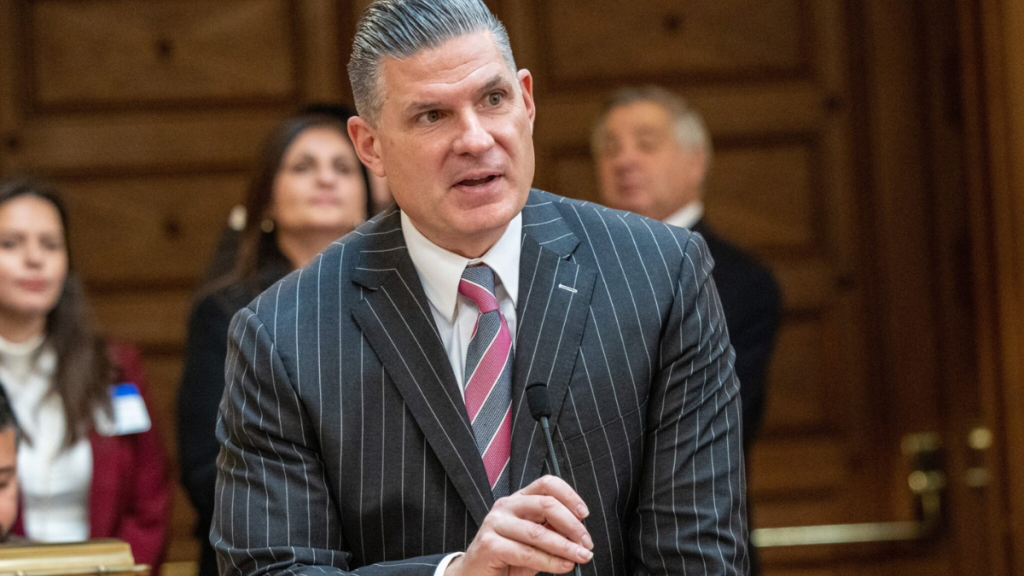New Jersey’s energy system is facing significant challenges, with rising costs, grid instability, and growing concerns over energy security. Many critics argue that Democratic-led policies have exacerbated these issues, leading to an energy infrastructure that is costly and inefficient.
In response, Republican lawmakers have introduced a comprehensive plan aimed at reforming the state’s energy policies to provide reliable, affordable, and sustainable power for residents and businesses.
Understanding the Energy Crisis in New Jersey
Over the past decade, New Jersey has embraced aggressive clean energy mandates, phasing out fossil fuels in favor of renewable sources such as wind and solar. While this transition aligns with environmental goals, critics argue that it has been implemented without adequate planning, leading to higher energy costs and reliability concerns.
- Soaring Energy Prices: The cost of electricity in New Jersey has surged, placing a burden on households and businesses. According to the U.S. Energy Information Administration (EIA), the average residential electricity rate in New Jersey is higher than the national average, partly due to subsidies for renewable projects.
- Grid Reliability Issues: The push toward renewable energy has raised concerns about grid reliability. Unlike traditional power sources such as natural gas and nuclear, renewables are intermittent, meaning they don’t always produce power when needed. This has led to grid instability, particularly during peak demand periods.
- Overdependence on Offshore Wind: The state’s focus on offshore wind projects has been met with criticism. While wind energy is a promising renewable source, critics argue that it is not a reliable sole solution and that massive investments in offshore wind farms have placed an economic strain on taxpayers.
- Regulatory Burdens: Stringent regulations have made it difficult for new energy projects to move forward, discouraging investment in traditional energy sources and slowing down the overall progress of the industry.
Republican Energy Reform Plan
To address these challenges, Republican leaders in New Jersey have proposed a comprehensive plan designed to balance energy affordability, reliability, and environmental responsibility. Key elements of the plan include:
1. Diversifying Energy Sources
Republicans advocate for a more balanced energy portfolio that includes renewables alongside traditional energy sources such as natural gas and nuclear power. By maintaining a mix of energy sources, the state can ensure grid stability and prevent overreliance on any single form of power generation.
2. Increasing Natural Gas Production
Natural gas remains one of the most reliable and cost-effective energy sources. The Republican plan calls for increased investment in natural gas infrastructure, including pipeline expansions to improve distribution efficiency. This would help lower costs while ensuring a steady supply of energy, particularly during high-demand periods.
3. Restoring Nuclear Energy Investment
New Jersey has historically relied on nuclear power as a significant energy source. The Republican proposal includes incentives to maintain and modernize nuclear facilities, ensuring they continue to provide stable and emission-free power. This approach would allow the state to transition toward a cleaner energy future without jeopardizing reliability.
4. Re-Evaluating Offshore Wind Investments
While offshore wind projects are part of the state’s clean energy strategy, Republicans argue that the current pace of development is financially unsustainable. They propose a more cautious approach that prioritizes cost-benefit analysis and considers alternative renewable solutions, such as expanded solar energy initiatives.
This would help prevent taxpayer money from being spent on projects that may not deliver the expected returns.
5. Cutting Excessive Regulations
Republican lawmakers believe that excessive regulations have driven up energy costs and slowed economic growth. Their plan includes regulatory reforms aimed at reducing bureaucratic hurdles for energy development while maintaining environmental protections.
By streamlining the approval process for new energy projects, Republicans hope to attract investment and boost competition in the energy sector.
6. Encouraging Private Sector Innovation
Rather than relying solely on government mandates, Republicans argue that the private sector should play a larger role in driving energy innovation. Their plan includes incentives for businesses to develop and adopt advanced energy technologies, such as battery storage and carbon capture, to improve efficiency and reduce emissions.

Potential Impact of the GOP Plan
If implemented, the Republican energy reform plan could have several key benefits:
- Lower Energy Costs: By diversifying energy sources and cutting unnecessary regulations, consumers and businesses could see lower electricity bills.
- Improved Grid Reliability: A balanced energy mix, including natural gas and nuclear, would enhance grid stability and reduce blackout risks.
- Sustainable Environmental Policies: Republicans emphasize that their plan does not reject clean energy but instead ensures its implementation is practical and cost-effective.
- Economic Growth: Supporting local energy production and reducing regulatory burdens could attract businesses and boost job creation in the energy sector.
- Reduced Dependence on Federal Aid: By promoting energy independence within the state, the Republican plan seeks to reduce reliance on federal funding for energy projects, giving New Jersey more control over its energy future.
Challenges and Opposition
The Republican proposal faces significant opposition from Democratic lawmakers and environmental advocacy groups. Critics argue that increasing natural gas production contradicts climate goals and that scaling back offshore wind investments could hinder progress toward a greener future.
Additionally, regulatory rollbacks may face legal challenges, as federal and state environmental laws place strict guidelines on energy infrastructure projects.
There is also the question of political feasibility. With a Democratic majority in the state legislature and a Democratic governor, passing sweeping changes to the state’s energy policies will require bipartisan negotiations and compromise.
Conclusion
New Jersey’s energy challenges require a comprehensive solution that balances cost, reliability, and sustainability. While Democrats have focused on an aggressive transition to renewables, Republicans are advocating for a more gradual and balanced approach that prioritizes affordability and energy security.
As the debate over New Jersey’s energy future continues, residents and businesses will need to consider the trade-offs between environmental goals and economic realities. The success of the Republican energy reform plan will ultimately depend on public support and legislative negotiations in Trenton.
For more information on New Jersey’s energy policies, visit the New Jersey Board of Public Utilities.
Disclaimer – Our team has carefully fact-checked this article to make sure it’s accurate and free from any misinformation. We’re dedicated to keeping our content honest and reliable for our readers.
